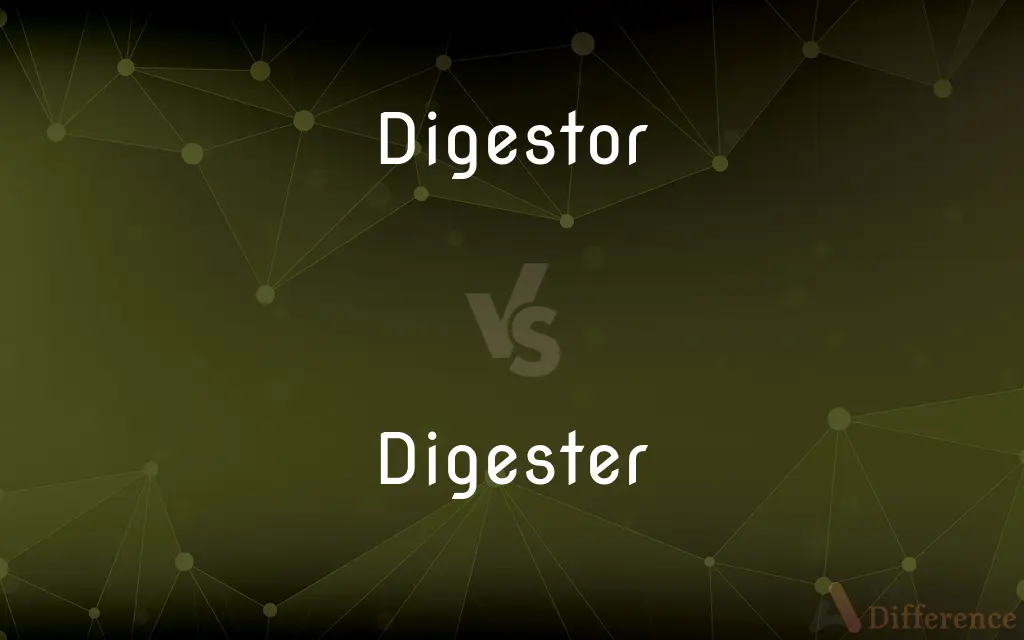Digestor vs. Digester — What's the Difference?
By Tayyaba Rehman & Fiza Rafique — Updated on April 26, 2024
A digestor refers to a scientist specializing in digestion, while a digester is a device or installation used for the breakdown of organic material.

Difference Between Digestor and Digester
Table of Contents
ADVERTISEMENT
Key Differences
A digestor is a term occasionally used to describe a scientist or researcher who studies the processes of digestion, focusing on how organisms break down food internally. On the other hand, a digester is a more common term referring to a machine or container used for the decomposition of organic materials, often to produce biogas.
In professional settings, a digestor would be involved in fields such as biology or medicine, conducting experiments and research to advance understanding of digestive mechanisms. Whereas, digesters are typically found in industrial or agricultural settings, where they are used to manage waste and produce energy.
The role of a digestor might include studying enzyme functions, gastrointestinal physiology, or the microbiome's effects on digestion. Conversely, a digester functions through biological processes such as anaerobic digestion to break down organic waste, reducing environmental impact and generating useful byproducts like methane.
The expertise of a digestor can contribute to developments in nutrition, health, and medicine, providing insights that can lead to better treatments or dietary recommendations. On the other hand, digesters contribute to sustainable practices in waste management and energy production, supporting renewable energy initiatives and reducing landfill use.
While a digestor works primarily in academic or clinical research environments, a digester’s operation is crucial in settings like wastewater treatment plants, farms, or renewable energy facilities, highlighting their practical applications in environmental management and sustainability.
ADVERTISEMENT
Comparison Chart
Definition
A scientist specializing in the study of digestion
A device for decomposing organic material
Field of Use
Biology, medicine
Environmental management, renewable energy
Purpose
Research and study of digestive processes
Waste management, biogas production
Key Functions
Studying enzyme activity, digestive health
Anaerobic digestion, methane production
Environment
Laboratories, academic institutions
Wastewater treatment plants, farms
Compare with Definitions
Digestor
One who conducts experiments related to digestion.
As a digestor, she focuses on how dietary fibers affect gut health.
Digester
An installation in waste management systems for anaerobic digestion.
The city’s wastewater treatment facility includes multiple digesters.
Digestor
A scientist whose work helps in understanding digestive processes.
The digestor’s research contributed to new insights into gluten intolerance.
Digester
A device used to decompose organic material to produce biogas.
The new digester at the plant can process 20 tons of waste per day.
Digestor
A researcher specializing in the study of digestive systems.
The digestor presented his findings on enzyme efficiency in different species.
Digester
A component in renewable energy systems converting waste into methane.
Their farm uses a digester to convert animal waste into energy.
Digestor
A professional in the field of gastrointestinal research.
He is a leading digestor studying the impact of probiotics on digestion.
Digester
An apparatus used in environmental technology to reduce landfill use.
By installing a digester, the community significantly cut down its carbon footprint.
Digestor
An expert in the mechanisms of biological breakdown of food.
The conference on digestive health will feature several renowned digestors.
Digester
A machine that breaks down biological material under controlled conditions.
The digester operates at high temperatures to speed up decomposition.
Digestor
Alternative form of digester
Digester
A digester (alternative: digestor) is a huge vessel where chemical or biological reactions are carried out. These are used in different types of process industries.
Digestor
See Digester.
Digester
One that makes a digest.
Digester
(Chemistry) A vessel in which substances are softened or decomposed, usually for further processing.
Digester
One who, or that which, digests.
Digester
A strong closed vessel in which bones or other substances may be subjected, usually in water or other liquid, to a temperature above that of boiling, in order to soften them.
Digester
(dated) A medicine or food that aids digestion, or strengthens digestive power.
Digester
One who digests.
Digester
A medicine or an article of food that aids digestion, or strengthens digestive power.
Rice is . . . a great restorer of health, and a great digester.
Digester
A strong closed vessel, in which bones or other substances may be subjected, usually in water or other liquid, to a temperature above that of boiling, in order to soften them.
Digester
Autoclave consisting of a vessel in which plant or animal materials are digested
Common Curiosities
How does a digester contribute to environmental sustainability?
A digester contributes by processing organic waste into renewable energy and reducing reliance on landfills.
What kind of training does a digestor need?
A digestor typically requires advanced degrees in fields such as gastroenterology, biology, or nutritional science.
What does a digestor study?
A digestor studies the biological and chemical processes of digestion in living organisms.
What are the main benefits of using a digester?
The main benefits include waste reduction, energy production, and the generation of natural fertilizers.
Are digesters expensive to operate?
While initial setup costs can be high, the long-term savings and environmental benefits can offset these expenses.
Can a digestor work in industry settings?
While primarily found in research, a digestor might consult for industries focusing on nutrition, health products, or pharmaceuticals.
Are there different types of digesters?
Yes, there are various types, including continuous, batch, and dry digesters, each suited to different processing needs.
Can the findings of a digestor influence public health policy?
Yes, research by digestors can influence policies on nutrition, public health, and preventive care.
How can one become a digestor?
Aspiring digestors should pursue higher education in relevant scientific fields and gain research experience.
What materials can be processed in a digester?
Digesters can process various organic materials, including food waste, agricultural residue, and sewage sludge.
What distinguishes a digester from a composter?
A digester anaerobically breaks down organic matter to produce biogas, whereas a composter decomposes organics aerobically without energy recovery.
How does a digestor’s work impact healthcare?
A digestor’s research can lead to better understanding and treatments of digestive disorders and improved dietary guidelines.
What safety measures are essential for operating a digester?
Key safety measures include monitoring gas emissions, maintaining temperature controls, and ensuring structural integrity.
What are the challenges faced by digestors in their research?
Challenges include securing funding, ethical issues around experimentation, and the complexity of digestive systems.
Why are digesters important in agriculture?
Digesters are important for managing animal waste, reducing greenhouse gas emissions, and producing natural fertilizer.
Share Your Discovery

Previous Comparison
Old vs. Shabby
Next Comparison
Confused vs. DiscombobulationAuthor Spotlight
Written by
Tayyaba RehmanTayyaba Rehman is a distinguished writer, currently serving as a primary contributor to askdifference.com. As a researcher in semantics and etymology, Tayyaba's passion for the complexity of languages and their distinctions has found a perfect home on the platform. Tayyaba delves into the intricacies of language, distinguishing between commonly confused words and phrases, thereby providing clarity for readers worldwide.
Co-written by
Fiza RafiqueFiza Rafique is a skilled content writer at AskDifference.com, where she meticulously refines and enhances written pieces. Drawing from her vast editorial expertise, Fiza ensures clarity, accuracy, and precision in every article. Passionate about language, she continually seeks to elevate the quality of content for readers worldwide.














































